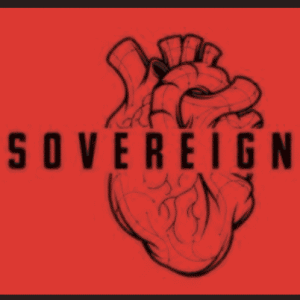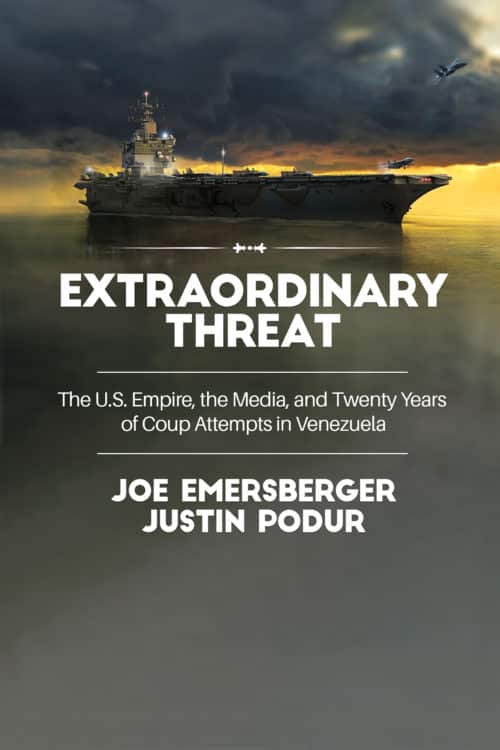Extraordinary Threat:
The U.S. Empire, the Media,
and Twenty Years of Coup Attempts in Venezuela
By Joe Emersberger and Justin Podur
328 pages; 16$ paper; 978-1-58367-916-6
Reviewed by Orlando Hill for Counterfire
It is hypocritical for the US president Joe Biden to condemn his Russian counterpart Vladimir Putin for aggression, as he is behaving exactly the same way as US governments have done for over 200 years. The opening lines in Emersberger and Podur’s book Extraordinary Threat reminds us that ‘for over a century, the United States has used terror tactics – including everything from direct invasion to economic strangulation – to assert its self-appointed right to rule over all countries in the Americas (p.9). I would add ‘in the world’, for it is hard to think of a country in which the US has not directly or indirectly intervened. And it isn’t something that is limited to the past. As pointed out by the authors, as recently as 2019 the US decided that democratically elected heads of states had to go: Bolivia’s Evo Morales, Nicaragua’s Daniel Ortega, and Venezuela’s Nicolas Maduro.
The reason for intervening in sovereign countries is very similar to that of Putin. They represent a threat to national security. Except that, in the case of the US, it is very difficult to justify the threat. After all, the Latin American countries have not joined a ‘defensive’ military alliance which considers the US as its prime enemy. The countries the US state treats as pariahs would welcome the opportunity of dealing with the US as equal sovereign nations.
The threat of alternatives
The threat is more that countries might represent a good example of developing in defiance of US orders. In the authors’ opinion, Venezuela represents an even greater ‘threat’. Since the start of this century, it has ‘provided a promising example of democratic and social reform under a government described by itself and its adversaries as socialist’ (p.9). Whether Venezuela is a socialist state or is on the path towards one is debatable. What is important is the perception. The fact that it is perceived as socialist opens the discussion towards other ways of development besides the neoliberal consensus.
For the US to get away with this hypocrisy, it must present itself as the victim. It seems that all imperial powers read from the same textbook. It does so through propaganda targeting the entire public, not just viewers of Fox News. The public must be made to support – or at least not care about – the crushing of a sovereign country.
For that to happen, it needs to count on the support of the more liberal sector. The propaganda must also come from NGOs, opposition parties and the liberal media, not just from the mainstream media and the government. For instance, in 2016, Bernie Sanders, the self-described democratic-socialist US senator, called Hugo Chavez a ‘dead communist dictator’ (p.15). It doesn’t matter that Sanders opposed regime change. By using defamatory language, he sets the terrain for the US to impose economic sanctions.
Another example is Amnesty International, which in 2018 called on the Venezuelan government to address the health and food crisis caused by the economic sanctions imposed by President Trump. The NGO refused to take a position on the sanctions. The position of organisations held in esteem by the liberal establishment matters. In 2019, when Shami Chakrabarti, the Labour Party’s shadow attorney general, was asked whether Jeremy Corbyn’s position on Maduro had been tough enough, she replied that she was not an expert on South America and relied on sources provided by organisations which she trusted, such as Amnesty International. The reports coming from them were pretty ‘damning’, and as ‘someone of the left’ she had to decry abuses in Venezuela (p.16).
Articles covering Venezuela in The Guardian, a major influencer among the liberal left, between 2006 and 2012, when living standards were rapidly improving, democratic participation was increasing, and Hugo Chavez was at the height of his popularity, were overwhelming hostile. Conversely, organisations and politicians that don’t toe the line are systematically demonised. Jeremy Corbyn, an anti-war campaigner and a friend of Venezuela, was ousted as leader of the Labour Party. The Stop the War Coalition and Palestine Solidarity Campaign are at the receiving end of a campaign of lies.
This same tactic is used both in domestic and foreign policies. However, as pointed out in the book:
‘in domestic politics, the lived experience of voters offers a reality check, however inadequate, on myths they are sold. Distorting the reality from faraway places like Venezuela is easier since few have the incentive to research beyond the most readily available sources for news and analysis’ (p.13).
War of attrition
The remaining eleven chapters of the book give a detailed analysis of the various coup attempts against the democratically elected government of Venezuela that were sponsored and supported by the US. These involved kidnapping the president, intervening in elections, and financing an opposition that defends violent tactics and economic sanctions which mostly harm the poor.
Those who follow events in Venezuela will probably be familiar with these attempts, but it is helpful to have them all in one book for reference. Those, like Shami Chakrabarti, who are not experts on South America should buy Extraordinary Threat and stop relying on certain organisations for their information.
While reading the book, the reader cannot help asking themselves whether it would be better for the people if the President Maduro just caved into the pressure. ‘After two decades of coup attempts, ever-tightening economic strangulation, and tens of thousands of deaths from preventable diseases, it could be tempting to assume that Venezuela’s surrender to US dictates would be better than the status quo’ (p.224). In social sciences, controlled experiments are very difficult to conduct. But Colombia, Venezuela’s neighbour, gives us a glimpse of what it would be like if Chavismo were to fall to the US sponsored right-wing opposition.
Between 1958 and 2013 more than 220 thousand were killed in Colombia’s civil war. About seven million of its population have been displaced. Between 1996 and 2005 there was a kidnapping every eight hours, and anti-personnel mines killed someone every day. Between 1980 and 2012, there were almost two thousand massacres, mostly committed by the state or paramilitary death squads. The paramilitary campaign was mostly directed against indigenous populations, bringing thirty-four groups to the verge of extinction. Colombia is the country the US state department holds up as an example of the co-operation it requires. The point the authors make is that Colombia’s permanent war against social movements is what is in store for Venezuela if the coup attempts were to succeed. If for no other reason, that should be why we must stand in solidarity with Venezuela.


Comments are closed.